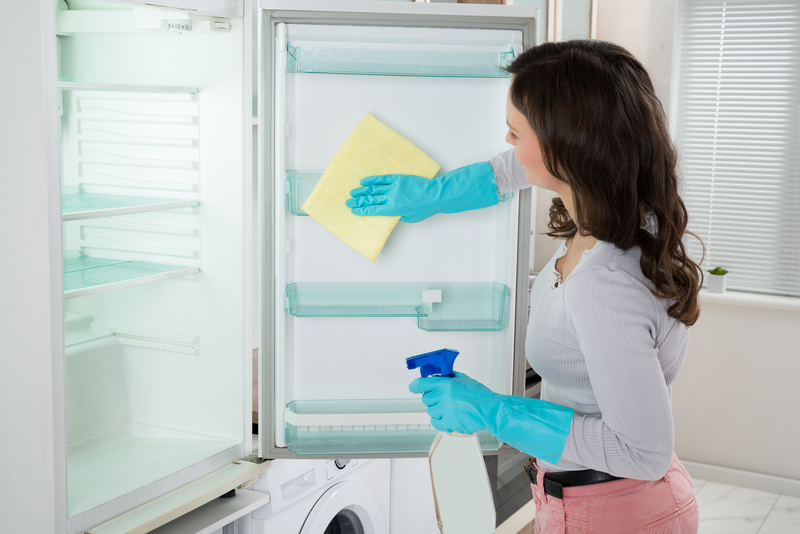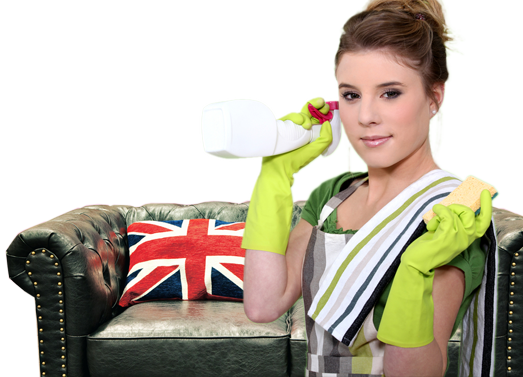Master the Art of Keeping Your Home Odor-Free
Posted on 22/09/2025
Master the Art of Keeping Your Home Odor-Free
Nothing beats coming home to a space that smells clean and fresh. Yet, household odors can sneak in from countless sources--pets, cooking, dampness, garbage, and more. If you've ever wondered how to master the art of keeping your home odor-free, you're in the right place! In this comprehensive guide, you'll discover actionable tips, effective solutions, and preventative strategies so your living environment always smells its best.
Why is an Odor-Free Home Important?
An odor-free home is more than just pleasant; it's also a sign of overall cleanliness and a healthy indoor environment. Persistent smells can indicate mold, bacteria buildup, or other issues that may impact your family's well-being. Additionally, guests form strong impressions based on scent, so maintaining a fresh home is vital for homeowners and renters alike.

Common Culprits of Unpleasant Household Odors
To eliminate odors effectively, you need to identify their sources. Here are the most common trouble spots in the average home:
- Garbage bins: Even when empty, trash cans can retain odors from leaking bags or decomposing waste.
- Kitchen sinks & drains: Food particles, grease, and soap scum build up, inviting bad smells.
- Bathrooms: Humidity and bacteria make bathrooms ground zero for stubborn odors.
- Refrigerators: Spilled or spoiled food can create lingering smells that are tough to fully eradicate.
- Pets: Our furry friends bring joy -- but occasionally, also strong odors from fur, litter boxes, and accidents.
- Upholstery and carpets: Fabrics trap everything from smoke to spilled drinks, making them prime targets for persistent odors.
- HVAC systems: Dust, mold, or even trapped rodents in vents can cause bad smell distribution throughout the home.
Ultimate Tips for Keeping Your Home Smelling Fresh
1. Adopt a Proactive Cleaning Routine
- Daily: Take out the trash, wipe counters, and quickly check for dirty laundry or pet accidents.
- Weekly: Vacuum carpets, mop hard floors, wash linens, and clean the bathroom (toilet, shower, sink).
- Monthly: Deep-clean appliances, wash pet bedding, clean windows, and sanitize your trash cans.
2. Address Odor Sources Immediately
Never ignore a bad smell! Find the source right away. The longer you wait, the harder it is to remove.
- Kitchens: Rinse and clean the sink and garbage disposal after use. Deodorize your refrigerator by regularly tossing expired food and wiping shelves with a mixture of baking soda and water.
- Bathrooms: Use exhaust fans to reduce humidity and wipe down all surfaces. Place an open box of baking soda in the bathroom to naturally absorb odors.
- Dirty laundry: Don't let clothes or towels pile up. Humidity creates mildew and musty smells.
3. Utilize Natural Odor Absorbers
Skip harsh chemicals and embrace nature's deodorizers for an eco-friendly odor control solution:
- Baking soda: Place open containers in closets, refrigerators, shoes, and other odor-prone areas. Sprinkle on carpets before vacuuming to absorb smells.
- Activated charcoal: Charcoal bags or pouches rapidly neutralize unpleasant scents in any room.
- White vinegar: Set out a bowl to absorb kitchen or pet odors. Mist diluted vinegar on soft furnishings if safe for the fabric.
- Coffee grounds: Dried used grounds in a shallow bowl can counteract strong odors in the fridge or microwave.
4. Improve Air Circulation
Stale air allows odors to linger. Foster freshness by keeping air moving:
- Open windows for at least 15 minutes a day, especially after cooking or cleaning.
- Use floor fans, ceiling fans, or your HVAC system to boost airflow throughout your home.
- Clean or replace HVAC filters every 1-3 months to prevent musty, dusty air.
5. The Importance of Humidity Control
Excess moisture is a catalyst for mold, mildew, and corresponding odors. Keep your home odor-free by managing humidity:
- Use a dehumidifier in damp areas like basements or bathrooms.
- Fix plumbing leaks quickly.
- Ensure proper ventilation in laundry and kitchen areas.
6. Aromatic Enhancements: Masking and Enhancing Scents
Once you've addressed the source, you can use natural fragrance methods to keep rooms smelling delightful:
- Simmer citrus peels and spices on the stove for a homemade air freshener.
- Burn soy or beeswax candles with essential oils for ongoing scent and air purification.
- Diffuse essential oils--like lavender, eucalyptus, lemon, or peppermint--for both fragrance and wellness benefits.
- Place sachets of dried herbs (lavender, rosemary, mint) in drawers and closets.
7. Invest in an Air Purifier
For persistent household odors or allergens, consider an air purifier with a HEPA filter and activated carbon layer. These devices remove particles, bacteria, and traps gasses and volatile organic compounds that cause bad smells. Choose a size appropriate for your high-traffic rooms.
Room-by-Room Guide to Maintaining Freshness
Kitchen
- Clean the fridge weekly; put an open box of baking soda inside.
- Wash and deodorize your trash or compost bin with vinegar or soap monthly.
- Wipe down countertops, sinks, and appliances.
- Don't let dirty dishes sit--run your dishwasher frequently.
Bathroom
- Wash bathmats and towels frequently to prevent mildew.
- Regularly scrub toilet, tub, and sinks with disinfectants.
- Install an exhaust fan or open a window during and after showers.
Living Room and Bedrooms
- Vacuum carpets and sofas weekly; sprinkle baking soda first if odors persist.
- Launder pillow covers, throws, and blankets regularly.
- Air out mattresses and use protective covers that resist dust and odor absorption.
Pet Areas
- Scoop litter boxes daily and replace litter weekly.
- Wash pet bedding on a hot water cycle.
- Wipe down toys and food dishes frequently.
The Best DIY Deodorizers for Your Home
Store-bought air fresheners often mask odors rather than eliminate them. If you want cost-effective, chemical-free freshness, try these DIY recipes!
1. Baking Soda Carpet Refresher
- Mix one cup of baking soda with 15 drops of your favorite essential oil.
- Sprinkle over carpets, let sit for 30 minutes, then vacuum.
2. Natural Room Spray
- Combine 1/2 cup distilled water, 1 tablespoon witch hazel, and 20 drops essential oil in a spray bottle.
- Shake and spritz as needed around the home.
3. Citrus Vinegar Cleaner
- Soak citrus peels in vinegar for 2 weeks, strain, and dilute with equal parts water.
- Use to clean and deodorize surfaces throughout the house.
Top Mistakes to Avoid When Trying to Keep a Home Odorless
- Masking, not treating: Avoid simply covering up smells with air fresheners.
- Forgeting to clean under and behind appliances: These spots collect grime and old food.
- Ignoring soft surfaces: Furniture, drapes, and rugs absorb and hold odors.
- Letting clutter collect: Piles of old papers, clothes, and boxes trap musty smells and dust.
- Poor ventilation: Not allowing fresh air in can make even mild smells feel overpowering.
Maintaining an Odor-Free Home Long-Term: Habits for Lasting Results
- Commit to a regular cleaning schedule and stick to it, even if it's just a few tasks each day.
- Pay close attention to rooms where moisture and clutter are likely to build up.
- Monitor for unusual odors (musty, rotten eggs, or burning), which could signal underlying problems.
- Encourage the whole family (including kids) to participate in odor-preventing routines.

FAQs About Keeping Your Home Odor-Free
- What's the fastest way to get rid of a bad smell?
Find the source and remove it immediately, ventilate the room, and use baking soda or charcoal to absorb lingering odors. - Is it safe to use vinegar or baking soda with pets around?
Absolutely! Both are pet-safe (as long as they are not ingested in large quantities), and they provide natural odor absorption without chemicals. - How often should I clean for optimal odor control?
A daily quick tidy, a weekly thorough cleaning, and monthly deep-clean sessions are ideal for consistent freshness.
Conclusion: Your Blueprint for a Naturally Fresh Home
With the right approach and habits, mastering the art of keeping your home odor-free is entirely within reach. Address sources promptly, use natural deodorizers, clean regularly, and embrace preventative strategies to maintain a home that smells clean and inviting every day.
Start today--breathe easier and enjoy the welcoming, odor-free sanctuary you deserve!
Latest Posts
Tiny Closet, Big Solutions: Organizing Tips for Small Spaces
Air Quality: Enriching Our Living and Working Environments
Master the Art of Keeping Your Home Odor-Free
Discover Effective Methods for Mould-Free Window Sills
Your Path to a Cleaner Home: Spring Cleaning with Our Deep Clean Advice





